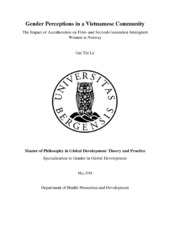Gender Perceptions in a Vietnamese Community. The Impact of Acculturation on First- and Second-Generation Immigrant Women in Norway
Abstract
This thesis seeks to analyze how Vietnamese women have settled into Norwegian society since their arrival during the mid-1970s to early 80s. It seeks to investigate how acculturation has impacted how migrant mothers have raised their daughters. Additionally, this thesis seeks to understand whether conflict occurs between the migrant mothers and their daughters due to conflicting perceptions of gender norms. There is limited research on these relationships among Vietnamese immigrants in Norway. Therefore, this thesis attempts to cover the research gap by answering the following question: how has acculturation into Norwegian society impacted the cultural transmission of traditional, Vietnamese gender norms from the first-generation to the second-generation Vietnamese women? The thesis has one chapter that develops a theoretical framework and a second that reviews extant literature. The theoretical framework discusses acculturation and various aspects of gender theory. The acculturation section emphasizes the tactics migrants use when they settle in a new country such as assimilation, separation, marginalization, and integration and the how these tactics impact migrants’ social and/or mental well-being. The section on gender highlights that gender is a social construct that is reproduced by people who “do” gender and how “doing” gender impacts the roles they play. The second chapter discusses literature on cultural transmission, intergenerational conflict, and notions of gender in Vietnamese communities. In order to evaluate these propensities in the participants of this study, this thesis utilizes a semi-structured interview to adapt to the participants responses of their own experiences living in Bergen, Norway. The findings suggest that the first-generation participants perceived themselves to be unaffected by their move to Norway and thus, migration did not impact the gender norms they wished to transmit to their daughters. While the main component of Vietnamese womanhood – sacrificing their own wants and desire for their family – appeared to be successfully transmitted, the second-generation believed their mother – contrary to what the first-generation participants thought – were impacted by Norwegian gender norms as their mothers encouraged their daughters to be independent of men and to speak up for themselves. Furthermore, the boys in the family were taught to do tasks that were generally seen to be within the domain of women back in Vietnam, thus, suggesting that the first-generation taught their sons the same norms they taught their daughters. When it comes to intergenerational conflict between mothers and daughters the findings suggest there was little conflict on notions of womanhood between the mothers and daughters of the study. However, this does not mean that intergenerational conflict, when it comes to cultural transmission, does not exist. The second-generation participants mention that these problems were prevalent amongst their friends or close family members, just not between the two participants. This thesis demonstrates that most first-generation participants are indeed impacted by their acculturation into Norwegian society. As they attempted to culturally transmit values of Vietnamese womanhood to their daughters, they also encouraged the second-generation to incorporate Norwegian gender norms in their daily life.
